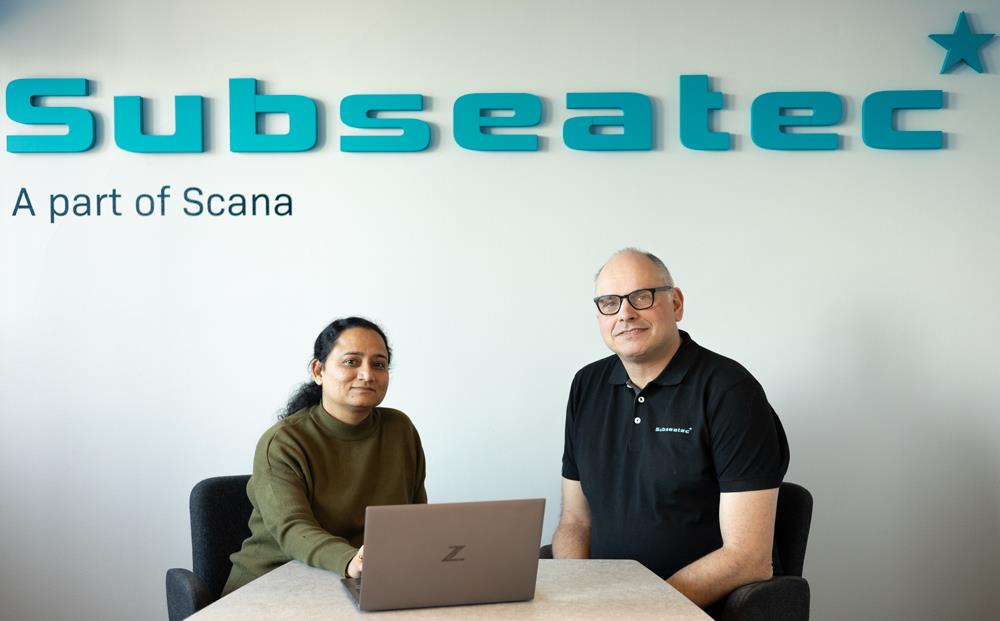
In the Nordic region, numerous immigrants encounter challenges in securing employment. At Subseatec, however, the narrative is different.
Hiralben Thakkar, a legal professional educated in India, has successfully established herself as a quality assurance specialist. This reflects Subseatec’s commitment to inclusiveness and openness, which Thakkar considers to be the fundamental strength of the organization.
“As an immigrant in Sweden, you have to work thrice as hard,” Thakkar states, emphasizing the importance of blending in, mastering the local language, and comprehending cultural nuances.
Originally hailing from Gujarat, India, Thakkar relocated to Scandinavia in 2014, accompanying her spouse, Balmukund, who was pursuing a doctoral degree in Tromsø, Norway. They moved to Sweden amidst the global pandemic.
“I’ve been very fortunate. My colleagues have accepted me since day one and shown immense trust,” telIs Thakkar.
She joined the company through a municipal program connecting immigrants with academic backgrounds with local companies. An opportunity that she learned through the local library. A week later, she was offered an internship at Subseatec, where she worked on databooksand Health, Safety, Environment, and Quality (HSEQ) – a natural fit given her legal background.
Networking challenges
“The typical employment pathway presents numerous hurdles without a local network. The absence of local references and the challenges of not being a native is significant,” Thakkar elucidates.
“This often means compromising oneself, and for many, especially women, it results in staying home despite high education levels. We saw the same when my husband was job hunting. He was sending 10-20 applicants each day. Without connections, it’s hard.”
” I’m thrilled I found this opportunity, and it proved me an adept learner and attentive listener. My uniqueness was not only accepted but celebrated. I was entrusted with engaging tasks from the beginning, providing me with strength and inspiration.”
Overcoming language barriers
Language barriers are common obstacles for foreign-born individuals entering the job market.
“lt’s an impediment, regardless of one’s skills or education. You start from zero,” Thakkar shares from her experience. “Embracing the learning curve with determination and patience is key, and a sense of humour helps too.”
“I made many mistakes learning Swedish, but my colleagues were supportive and kind, and we all laughed together. Everyone understands that learning a new language is hard. And when needed, asking people to speak slowly or switching to English has always worked well,” she says.
“My Swedish is less nuanced than my English, but the directness can be a strength. When I speak, it’s straightforward, with no hidden meanings,” she laughs. “Everybody knows precisely what I want.”
“Since we operate internationally and use English as our main language, we can think broadly in our hiring practices,” says Peter Jansson, Managing Director at Subseatec. “This offers an accessible path for non Swedish speakers, many of whom pick up the language once they start working with us.”
Thus, Thakkar started working even before mastering Swedish and continued learning alongside her new coworkers. In her project group, 40 % of employees are women, while 60% are men, many of whom have international backgrounds.
A culture of collaboration
Today, Thakkar isa permanent and integral member of the Subseatec team, and she highly values the trust and openness within the company. The organization’s flat hierarchy and transparent culture have been instrumental in her rapid learning and integration.
“Subseatec’s environment is characterized by flexibility and collaboration, fostering a supportive and familial atmosphere,” she notes. “In India, I was used to a more rigid hierarchy, but here, I could approach anyone with questions, including the boss.
This open culture is unique, and everyone is acting as mentors and guides for each other, working towards a shared vision.”
“Here, every day brings new projects and challenges that we tackle together. That’s what drives me and gives me meaning,” she says, smiling while discussing the company culture. “People stay here forever.”
Acceptance over quality
Thakkar believes in aiming for acceptance rather than equality in diversity and inclusion.
“lt’s more fruitful to embrace differences. True equality might be unattainable, but acceptance is achievable. lt’s about being conscious of what’s missing in the team and welcoming diversity in thought, not just nationality or gender.”
“In today’s global marketplace, embracing diverse perspectives is not just beneficial; it’s a competitive advantage,” she asserts. “Companies that understand and value this diversity are better positioned to thrive internationally.”
A strategy of openness
Peter Jansson elaborates on Subseatec’s approach, “Our focus is on neutrality and transcending conventional barriers such as gender, age, and origin.”
“This hasn’t been a deliberate recruitment strategy, but rather an openness to where expertise lies,” he adds, referring to the collaboration with the municipality.
“Our most recent hire, a 25-year-old woman, was selected not for her gender or origin but because she was the most qualified, outperforming other candidates.” Peter Jansson emphasizes the value of alternative recruitment channels over quotas, noting, “Adherence to irrelevant criteria can lead to suboptimal decisions.”
He recognizes the significant benefits of a diverse workplace, fostering an open and mindful culture that encourages many questions and new perspectives.

